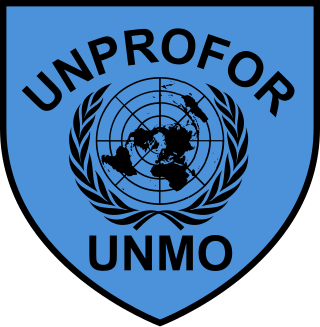
The United Nations Protection Force was the first United Nations peacekeeping force in Croatia and in Bosnia and Herzegovina during the Yugoslav Wars. The force was formed in February 1992 and its mandate ended in March 1995, with the peacekeeping mission restructuring into three other forces.

The United Nations Confidence Restoration Operation in Croatia, commonly abbreviated UNCRO, was a United Nations (UN) peacekeeping mission in Croatia. It was established under Chapter VII of the United Nations Charter and approved by the UN Security Council (UNSC) Resolution 981 on 31 March 1995. UNCRO inherited personnel and infrastructure from the United Nations Protection Force (UNPROFOR). Its command was located in Zagreb; the peacekeeping troops were deployed in four sectors named North, South, East, and West. Twenty different countries contributed troops to the mission.
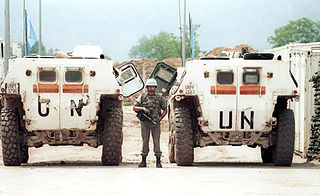
United Nations Security Council resolution 743, adopted unanimously on 21 February 1992, after reaffirming resolutions 713 (1991), 721 (1991), 724 (1991), 727 (1992) and 740 (1992), and considering that the situation in the Socialist Federal Republic of Yugoslavia constituted a threat to international peace and stability, the council established a peacekeeping mission in the country, known as the United Nations Protection Force (UNPROFOR), with the aim of reaching a peaceful political settlement in the region.

United Nations Security Council resolution 807, adopted unanimously on 19 February 1993, after reaffirming Resolution 743 (1992) and all subsequent relevant resolutions concerning the United Nations Protection Force (UNPROFOR), the Council determined that the situation in Bosnia and Herzegovina and Croatia continued to constitute a threat to international peace and security and therefore extended the mandate of UNPROFOR for an interim period ending 31 March 1993.

United Nations Security Council resolution 820, adopted on 17 April 1993, after reaffirming all previous resolutions on the topic for a lasting peace settlement in Bosnia and Herzegovina and the region, the council discussed the peace plan for Bosnia and Herzegovina and comprehensive steps to ensure its implementation.

United Nations Security Council resolution 824, adopted unanimously on 6 May 1993, after considering a report by the Secretary-General Boutros Boutros-Ghali pursuant to Resolution 819 (1993), the council discussed the treatment of certain towns and surroundings as "safe areas" in Bosnia and Herzegovina.
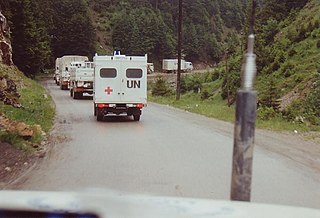
United Nations Security Council resolution 836 was adopted on 4 June 1993. After reaffirming Resolution 713 (1991) and all subsequent resolutions on the situation in the former Yugoslavia, the Council expressed its alarm at the continuing situation in Bosnia and Herzegovina and decided to expand the mandate of the United Nations Protection Force (UNPROFOR) by allowing it to use force to protect the "safe areas".

United Nations Security Council resolution 847, adopted unanimously on 30 June 1993, after reaffirming Resolution 743 (1992) and subsequent resolutions relating to the United Nations Protection Force (UNPROFOR), the council condemned military attacks in Croatia and Bosnia and Herzegovina and extended the mandate of UNPROFOR until 30 September 1993.

United Nations Security Council resolution 859, adopted unanimously on 24 August 1993, after recalling all resolutions on the situation in Bosnia and Herzegovina, the council noted that, despite all previous security council resolutions since Resolution 713 (1991), the region was still a scene of hostilities and there was little compliance with previous resolutions, particularly by the Bosnian Serb party.
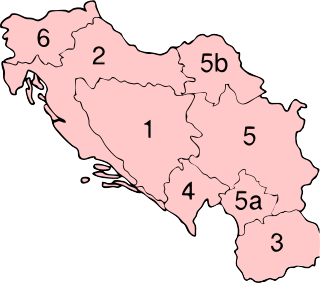
United Nations Security Council resolution 871, adopted unanimously on 4 October 1993, after reaffirming resolutions 713 (1992) and 743 (1992) and subsequent resolutions relating to the situation in the former Yugoslavia and United Nations Protection Force (UNPROFOR), the Council expressed concern that United Nations peacekeeping plan for Croatia, in particular Resolution 769 (1992), had not been implemented and went on to discuss the peace plan and extend UNPROFOR's mandate until 31 March 1994.
United Nations Security Council resolution 908, adopted unanimously on 31 March 1994, after reaffirming all resolutions on the situation in the former Yugoslavia and in particular Resolution 871 (1993), the council extended the mandate of the United Nations Protection Force (UNPROFOR) until 30 September 1994 and declared its intention to increase the number of personnel in the peacekeeping force.

United Nations Security Council resolution 913 was adopted unanimously on 22 April 1994, after reaffirming all resolutions on the situation in Bosnia and Herzegovina and also Resolution 908 (1994). The Council discussed the situation in the safe area of Goražde and a settlement of the conflict.

United Nations Security Council resolution 947, adopted unanimously on 30 September 1994, after recalling all resolutions on the situation on the former Yugoslavia including Resolution 908 (1994), the Council discussed the situation in Croatia and extended the mandate of the United Nations Protection Force (UNPROFOR) until 31 March 1995.
United Nations Security Council resolution 982, adopted unanimously on 31 March 1995, after reaffirming all resolutions on the situation in the former Yugoslavia in particular Resolution 947 (1994) concerning the United Nations Protection Force (UNPROFOR), the Council extended the mandate of UNPROFOR for additional period terminating 30 November 1995 and discussed operations in Croatia.

United Nations Security Council resolution 994, adopted unanimously on 17 May 1995, after reaffirming all resolutions on the conflicts in the former Yugoslavia, particularly resolutions 981 (1995), 982 (1995) and 990 (1995), the Council discussed the withdrawal of Croatian Army from the zone of separation taken in Operation Flash on May 1st and the full deployment of the United Nations Confidence Restoration Operation in Croatia (UNCRO).

United Nations Security Council resolution 998, adopted on 16 June 1995, after reaffirming all resolutions on the conflicts in the former Yugoslavia, in particular Resolution 982 (1994), the council established a rapid reaction force of up to 12,500 personnel within the United Nations Protection Force (UNPROFOR) in Bosnia and Herzegovina following attacks on it and the overall deteriorating situation.

United Nations Security Council resolution 1025, adopted unanimously on 30 November 1995, after recalling resolutions 981 (1995) and 1023 (1995) on Croatia, the Council decided that the mandate of the United Nations Confidence Restoration Operation (UNCRO) would terminate after an interim period ending 15 January 1996.
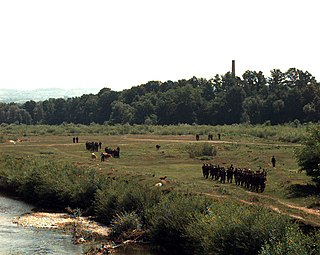
United Nations Security Council resolution 1026, adopted unanimously on 30 November 1995, after recalling resolutions 982 (1995) and 998 (1995) on the United Nations Protection Force (UNPROFOR), the Council authorised an extension of its mandate until 31 January 1996.

United Nations Security Council resolution 1031, adopted unanimously on 15 December 1995, after recalling all previous resolutions on the conflicts in the former Yugoslavia, the council, acting under Chapter VII of the United Nations Charter, discussed the transfer of authority from the United Nations Protection Force (UNPROFOR) to the multinational Implementation Force (IFOR).

United Nations Security Council resolution 1037, adopted unanimously on 15 January 1996, after recalling previous resolutions on Croatia including resolutions 1023 (1995) and 1025 (1995), the council established the United Nations Transitional Authority for Eastern Slavonia, Baranja and Western Syrmia (UNTAES) for an initial period of 12 months.
















